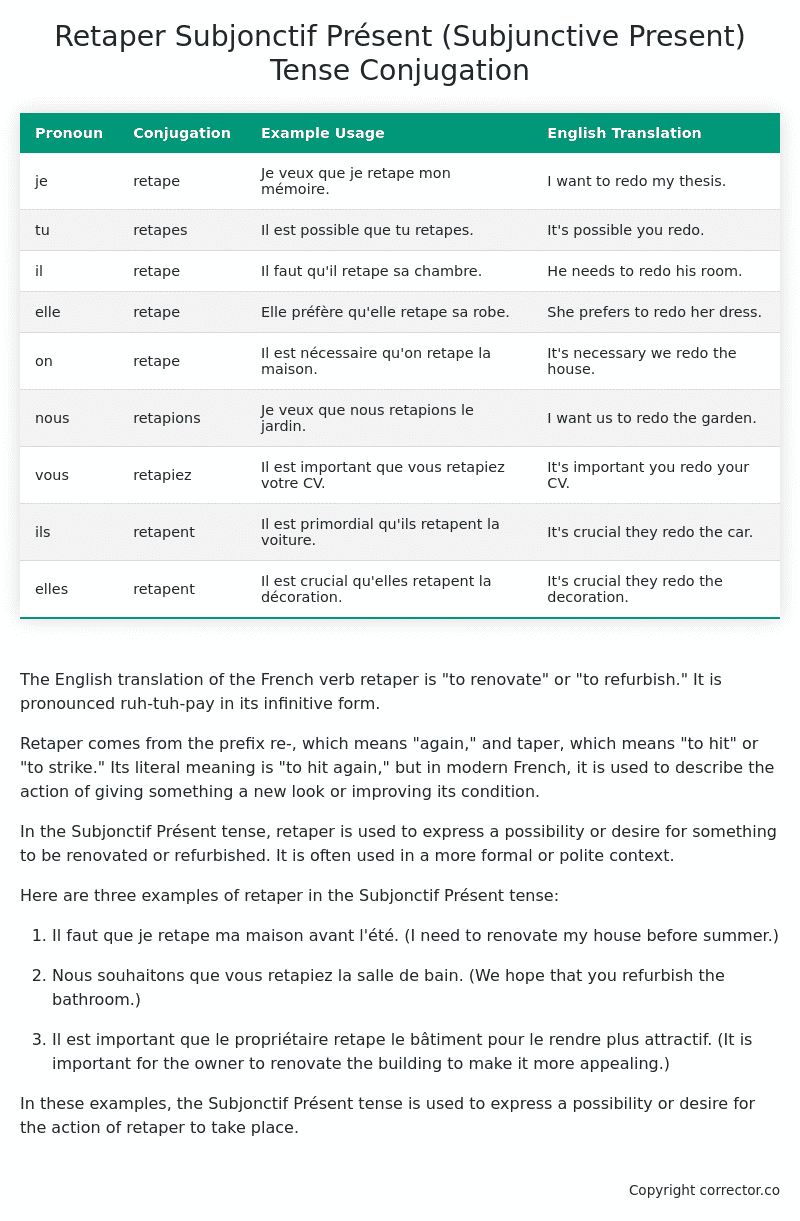Subjonctif Présent (Subjunctive Present) Tense Conjugation of the French Verb retaper
Introduction to the verb retaper
The English translation of the French verb retaper is “to renovate” or “to refurbish.” It is pronounced ruh-tuh-pay in its infinitive form.
Retaper comes from the prefix re-, which means “again,” and taper, which means “to hit” or “to strike.” Its literal meaning is “to hit again,” but in modern French, it is used to describe the action of giving something a new look or improving its condition.
In the Subjonctif Présent tense, retaper is used to express a possibility or desire for something to be renovated or refurbished. It is often used in a more formal or polite context.
Here are three examples of retaper in the Subjonctif Présent tense:
-
Il faut que je retape ma maison avant l’été. (I need to renovate my house before summer.)
-
Nous souhaitons que vous retapiez la salle de bain. (We hope that you refurbish the bathroom.)
-
Il est important que le propriétaire retape le bâtiment pour le rendre plus attractif. (It is important for the owner to renovate the building to make it more appealing.)
In these examples, the Subjonctif Présent tense is used to express a possibility or desire for the action of retaper to take place.
Table of the Subjonctif Présent (Subjunctive Present) Tense Conjugation of retaper
| Pronoun | Conjugation | Example Usage | English Translation |
|---|---|---|---|
| je | retape | Je veux que je retape mon mémoire. | I want to redo my thesis. |
| tu | retapes | Il est possible que tu retapes. | It’s possible you redo. |
| il | retape | Il faut qu’il retape sa chambre. | He needs to redo his room. |
| elle | retape | Elle préfère qu’elle retape sa robe. | She prefers to redo her dress. |
| on | retape | Il est nécessaire qu’on retape la maison. | It’s necessary we redo the house. |
| nous | retapions | Je veux que nous retapions le jardin. | I want us to redo the garden. |
| vous | retapiez | Il est important que vous retapiez votre CV. | It’s important you redo your CV. |
| ils | retapent | Il est primordial qu’ils retapent la voiture. | It’s crucial they redo the car. |
| elles | retapent | Il est crucial qu’elles retapent la décoration. | It’s crucial they redo the decoration. |
Other Conjugations for Retaper.
Le Present (Present Tense) Conjugation of the French Verb retaper
Imparfait (Imperfect) Tense Conjugation of the French Verb retaper
Passé Simple (Simple Past) Tense Conjugation of the French Verb retaper
Passé Composé (Present Perfect) Tense Conjugation of the French Verb retaper
Futur Simple (Simple Future) Tense Conjugation of the French Verb retaper
Futur Proche (Near Future) Tense Conjugation of the French Verb retaper
Plus-que-parfait (Pluperfect) Tense Conjugation of the French Verb retaper
Passé Antérieur (Past Anterior) Tense Conjugation of the French Verb retaper
Futur Antérieur (Future Anterior) Tense Conjugation of the French Verb retaper
Subjonctif Présent (Subjunctive Present) Tense Conjugation of the French Verb retaper (this article)
Subjonctif Passé (Subjunctive Past) Tense Conjugation of the French Verb retaper
Subjonctif Imparfait (Subjunctive Imperfect) Tense Conjugation of the French Verb retaper
Subjonctif Plus-que-parfait (Subjunctive Pluperfect) Tense Conjugation of the French Verb retaper
Conditionnel Présent (Conditional Present) Tense Conjugation of the French Verb retaper
Conditionnel Passé (Conditional Past) Tense Conjugation of the French Verb retaper
L’impératif Présent (Imperative Present) Tense Conjugation of the French Verb retaper
L’infinitif Présent (Infinitive Present) Tense Conjugation of the French Verb retaper
Struggling with French verbs or the language in general? Why not use our free French Grammar Checker – no registration required!
Get a FREE Download Study Sheet of this Conjugation 🔥
Simply right click the image below, click “save image” and get your free reference for the retaper Subjonctif Présent tense conjugation!

Retaper – About the French Subjonctif Présent (Subjunctive Present) Tense
Formation of the Subjonctif Présent
Common Everyday Usage Patterns
Interactions with Other Tenses
Summary
I hope you enjoyed this article on the verb retaper. Still in a learning mood? Check out another TOTALLY random French verb conjugation!


